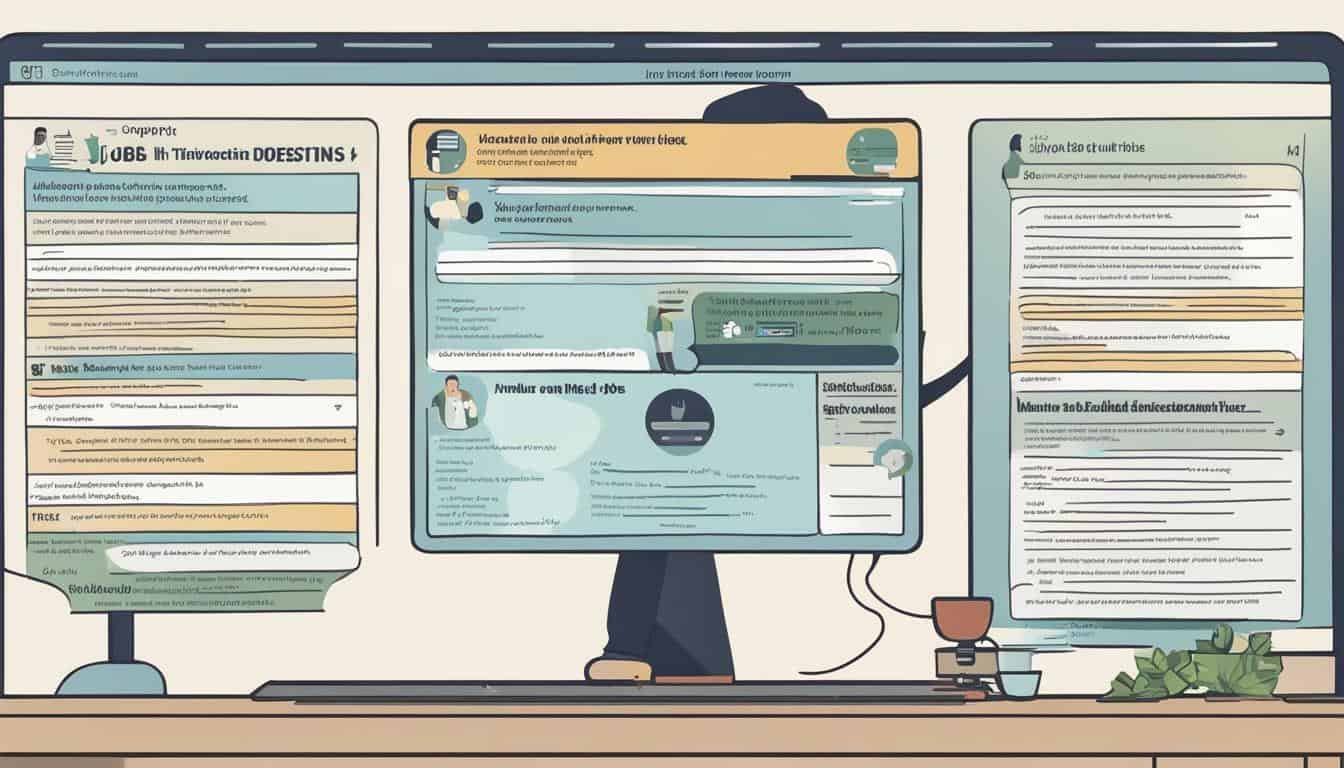If you’re an IT professional seeking greater flexibility and income potential, freelance IT work could be the perfect fit for you. By working as an independent contractor, you have the freedom to set your own schedule, choose the projects you work on, and potentially earn more than you would in a traditional IT job.
Freelance IT jobs are in high demand in the U.S., with opportunities available for a variety of positions, including freelance developers and software engineers. If you have a passion for technology and a desire for greater independence in your career, freelance IT work could be the solution you’ve been looking for.
Key Takeaways:
- Freelance IT work offers greater flexibility and income potential.
- Opportunities abound for freelance IT jobs in the U.S.
- Freelance developers and software engineers are in high demand.
Why Choose Freelance IT Work?
If you have a passion for technology and are looking for a flexible career with plenty of opportunities, then becoming an IT contractor or freelance tech worker might be the perfect fit for you.
Few career paths offer the level of independence and variety of projects that freelance IT work can provide. Remote IT jobs allow you to work from anywhere, while the ability to set your own schedule and work on different projects means you can enjoy a healthy work-life balance.
But the benefits don’t stop there. As a freelance IT professional, you have the chance to broaden your skill set and work with clients across different industries. This means gaining valuable experience and building a diverse portfolio of work that can help you stand out in a competitive market.
For those with expertise in programming, freelance developer positions can offer even more earning potential. Because you’re working directly with clients, you have the freedom to set your own rates and negotiate contracts that work best for you.
Finding Freelance IT Jobs
Looking for freelance IT jobs can be challenging, but with the right strategies, it can be a rewarding and lucrative experience. Here are some tips to help you find IT projects that match your skills and interests:
1. Utilize Online Platforms
There are several online platforms where you can find freelance IT jobs. Some popular options include Upwork, Fiverr, and Freelancer. These platforms allow you to create a profile, showcase your portfolio, and bid on projects. Utilize the search filters to find relevant IT projects, and apply to those that match your skills.
2. Network and Leverage Connections
Networking is an important aspect of finding freelance IT jobs. Reach out to former colleagues, friends, and family members who may be able to connect you with potential clients. Attend relevant industry events, join online forums and groups, and engage with other professionals in your field.
3. Build a Strong Portfolio
Your portfolio is a reflection of your skills and capabilities. As a freelance IT professional, it’s important to have a strong portfolio that showcases your best work. Include projects that demonstrate your technical expertise and problem-solving abilities. Share the link to your portfolio with potential clients and include it in your job applications.
4. Showcase Relevant Skills
When applying for freelance IT jobs, make sure to highlight your relevant skills and experience. Tailor your job applications to match the requirements of each project you apply for. This will increase your chances of getting hired and show potential clients that you have the skills they need.
5. Leverage Professional Connections
Professional connections can lead to freelance IT jobs. Reach out to former clients, colleagues, and industry contacts and let them know you’re available for work. Keep in touch with your network and ask for referrals. Referrals are a valuable source of work and can help you build a strong client base.
6. Stay Persistent and Consistent
Don’t give up if you don’t land a freelance IT job right away. Stay persistent and consistent in your job search. Apply to as many relevant projects as you can, and follow up with potential clients to show your interest in the project. Eventually, you’ll find the right opportunity that matches your skills and goals.
By utilizing these strategies, you can find freelance IT jobs that match your skills and interests, and build a successful career as an independent IT contractor or freelance software engineer.
Setting Your Rates as a Freelance IT Professional
As a freelance IT professional, one of the most important decisions you’ll make is determining your rates. Your rate should be a reflection of your expertise, experience, and the value you provide to clients. It’s important not to undersell yourself, as this could lead to lower earnings and a negative impact on the industry as a whole. Follow these tips when setting your rates:
- Research industry standards for freelance IT work, including rates for freelance developers and independent IT contractors.
- Consider your level of experience and expertise. If you’re newer to the industry, you may want to set lower rates initially and gradually increase them over time as you gain more experience.
- Take into account the market demand for your specific skills and expertise.
- Don’t forget to factor in overhead costs, such as equipment, software, and workspace expenses, when calculating your rates.
When negotiating rates with clients, be confident in the value you provide and don’t be afraid to stand firm on your rates. Negotiate in a professional and respectful manner to maintain strong relationships with clients.
Ultimately, setting your rates as a freelance IT professional requires a balance between valuing your skills and remaining competitive in the market. By determining your rates thoughtfully, you can ensure fair compensation for your work and a successful freelance career.
Navigating the Freelance IT Market in the U.S.
Freelance IT work in the U.S. is a rapidly growing industry, with more companies embracing the benefits of hiring independent IT professionals. As an IT freelancer, it’s important to understand the current market landscape and adapt to stay competitive.
One of the advantages of freelance IT work is the flexibility to work remotely for clients across the country. However, with this freedom comes stiff competition for freelance IT jobs. To set yourself apart, it’s essential to showcase your skills and build a strong portfolio.
One trend in the freelance IT market is the demand for specific skills, such as software engineering and cybersecurity. As a freelance IT professional, it’s important to stay up-to-date with the latest trends and continuously upskill to meet market demand.
Another challenge freelance IT professionals may face is managing unpredictable income. It’s essential to budget accordingly and plan for periods of lower earnings.
Ultimately, the freelance IT market in the U.S. provides ample opportunities for IT freelancers to grow their skills, gain experience across different industries, and potentially earn higher wages. By understanding the market and staying adaptable, you can succeed as an independent IT contractor.
Building a Successful Freelance IT Business
As an independent IT worker, building a successful freelance business requires more than technical skills.
Branding is crucial in standing out in a competitive market. Consider creating a personal website or social media presence that showcases your work and establishes a clear message about your expertise and value proposition.
Marketing is also key to finding new clients. Leverage your network, attend industry events, and use online platforms such as LinkedIn and job boards to gain exposure and increase your chances of landing new projects.
Maintaining strong client relationships is essential to growing your business. Communicate effectively, be responsive, and deliver quality work on time. Happy clients are more likely to refer you to others and provide recurring business.
Expanding your network and leveraging referrals are effective ways to grow your business. Consider reaching out to former colleagues, attending industry events, and using social media to connect with potential clients.
As an IT contractor or freelance developer, strategic planning and long-term thinking is essential for sustainability and growth. Continuously evaluate your skills, keep up with industry trends, and adapt to changes in the market to stay competitive and in-demand.
Managing Your Freelance IT Workload
As a freelance IT professional, you have the freedom to work on your own terms and take on projects that interest you. However, managing your workload can be a challenge. With multiple projects and deadlines to juggle, it’s important to have effective time management strategies in place to ensure you’re delivering quality work to your clients.
One advantage of freelance IT work is the ability to work remotely. This gives you the flexibility to work from anywhere, whether it’s a coffee shop or your home office. However, it’s important to set boundaries and create a dedicated workspace to avoid distractions and maintain focus.
Another strategy for managing your workload is prioritization. It’s important to assess the urgency and importance of each project and prioritize accordingly. This can help you avoid feeling overwhelmed and ensure you’re meeting your deadlines.
It’s also crucial to maintain a healthy work-life balance. As a freelance IT professional, it can be easy to blur the lines between work and personal time. However, it’s important to set boundaries and prioritize self-care to avoid burnout.
Overall, effective time management and workload prioritization are essential for success as a freelance IT professional. With the flexibility of remote work and the ability to set your own schedule, you can achieve a healthy work-life balance while delivering quality work to your clients.
Upskilling and Continuous Learning in Freelance IT Work
As a freelance IT professional, it’s crucial to stay up-to-date with the latest technology trends and continuously improve your skills. This not only helps you deliver better quality work, but also keeps you competitive in the freelance market. Here are some tips on how to upskill and continue learning as a freelance software engineer or tech worker:
Take Online Courses and Certifications
There are many online courses and certifications available that can help you stay current with the latest technologies and best practices. Websites like Coursera, Udemy, and LinkedIn Learning offer a wide range of options, from basic programming courses to advanced development techniques. Many of these courses are self-paced, which makes them ideal for busy freelancers with irregular schedules.
Read Technical Blogs and Articles
Reading technical blogs and articles is an excellent way to keep up with the latest trends in your field. Follow industry leaders and influencers on social media to stay updated on the latest news and developments. Popular tech blogs like TechCrunch and Wired are also great sources for up-to-date information and insights.
Attend Conferences and Meetups
Attending conferences and meetups is a great way to network with other tech professionals and learn about the latest trends and innovations. Many of these events feature expert speakers and hands-on workshops that can help you improve your skills and knowledge. Look for events in your local area or consider attending a national conference to connect with other freelance software engineers and tech workers.
Join Online Communities
Joining online communities and forums can provide valuable opportunities for networking and collaboration. Popular platforms like Stack Overflow, GitHub, and Reddit are great places to connect with other tech professionals and learn from their experiences. Participating in online discussions and sharing your own knowledge can also help you build your personal brand and reputation as a freelance IT professional.
By prioritizing upskilling and continuous learning, you can stay ahead of the curve and position yourself as a top freelance software engineer or tech worker in the U.S.
Overcoming Challenges in Freelance IT Work
Freelance IT work comes with its own set of challenges that can be overwhelming at times. As a freelancer, you are responsible for managing your own workload, finding clients, and ensuring a steady income. Here are some common challenges you may face and strategies to overcome them:
Managing Unpredictable Income
One of the biggest challenges of freelance IT work is managing unpredictable income. Unlike traditional employment, freelancers may experience fluctuations in their income due to changes in demand, project delays, or unexpected cancellations. To overcome this challenge, it’s important to create a budget and set aside an emergency fund to cushion any financial blows. You can also consider diversifying your services and finding multiple sources of income to ensure a more stable stream of revenue.
Dealing with Difficult Clients
Dealing with difficult clients can be frustrating and stressful, but it’s a common challenge that freelance IT professionals face. To overcome this challenge, it’s important to communicate clearly with your clients from the start and set expectations for the project. If a client becomes difficult to work with, remain professional and try to find a solution that works for both parties. If necessary, you can terminate the contract provided you do so professionally.
Maintaining Work-Life Balance
Freelance IT work can often blur the lines between work and personal life, making it challenging to maintain a healthy work-life balance. It’s important to set boundaries and create a schedule that works for you. Avoid working excessively long hours, and take breaks throughout the day to refresh your mind and prevent burnout. You can also consider outsourcing tasks to freelancers or hiring employees to delegate work and manage your workload more effectively.
By acknowledging and addressing these challenges, you can overcome them and achieve success as a freelance IT professional. Remember to stay motivated and focused on your goals, and continue to improve your skills and stay current with industry trends and demands.
Conclusion
As you have learned, freelance IT work offers numerous advantages, including the freedom to set your own schedule, the potential for higher earnings, and the opportunity to gain experience in different industries.
If you choose to pursue freelance IT jobs in the U.S., remember to carefully consider your rates, build a strong portfolio and network, and continuously upskill yourself to stay competitive. While there may be challenges along the way, such as managing unpredictable income or dealing with difficult clients, there are also strategies for overcoming these obstacles and building a successful freelance IT business.
Overall, embracing freelance IT work as an IT contractor or freelance developer can be a pathway to unlocking your true potential. So why not take the chance and see where it takes you?
FAQ
Q: What is freelance IT work?
A: Freelance IT work refers to independent contract work in the IT industry. It involves working on projects for different clients on a temporary basis, instead of being employed by a single company.
Q: What are the benefits of freelance IT work?
A: Freelance IT work offers flexibility in choosing the projects you work on and the freedom to set your own schedule. It also allows for higher earning potential compared to traditional employment in the IT industry.
Q: How can I find freelance IT jobs?
A: There are several ways to find freelance IT jobs. You can explore online platforms dedicated to freelance work, network with professionals in the industry, and leverage your existing connections. It is also important to build a strong portfolio and showcase your relevant skills.
Q: How do I determine my rates as a freelance IT professional?
A: Your rates as a freelance IT professional will depend on factors such as your expertise, experience, and the market demand for your skills. It is important to value your skills and not undersell yourself. Negotiating rates with clients is also a key aspect of setting your rates.
Q: What should I consider when navigating the freelance IT market in the U.S.?
A: When navigating the freelance IT market in the U.S., it is important to stay informed about current trends and demand for specific skills. Adapting to market changes and staying competitive will be crucial for success as a freelance IT professional.
Q: How can I build a successful freelance IT business?
A: To build a successful freelance IT business, focus on branding, marketing, and maintaining strong client relationships. Expand your network and leverage referrals. Delivering high-quality work and building a reputation for excellence will also contribute to your success.
Q: How do I manage my workload as a freelance IT professional?
A: Effective time management and workload prioritization are key to successfully managing your freelance IT workload. Set boundaries, manage multiple projects, and strive to achieve a balance between work and personal life.
Q: How can I upskill and continuously learn in freelance IT work?
A: Staying updated with the latest technology trends and continuously improving your skills is essential in freelance IT work. Take advantage of resources for upskilling, such as online courses and professional development opportunities.
Q: What are some common challenges in freelance IT work and how can I overcome them?
A: Common challenges in freelance IT work include managing unpredictable income, dealing with difficult clients, and maintaining work-life balance. Overcoming these challenges requires strategies such as budgeting, effective communication, and setting boundaries.




0 Comments